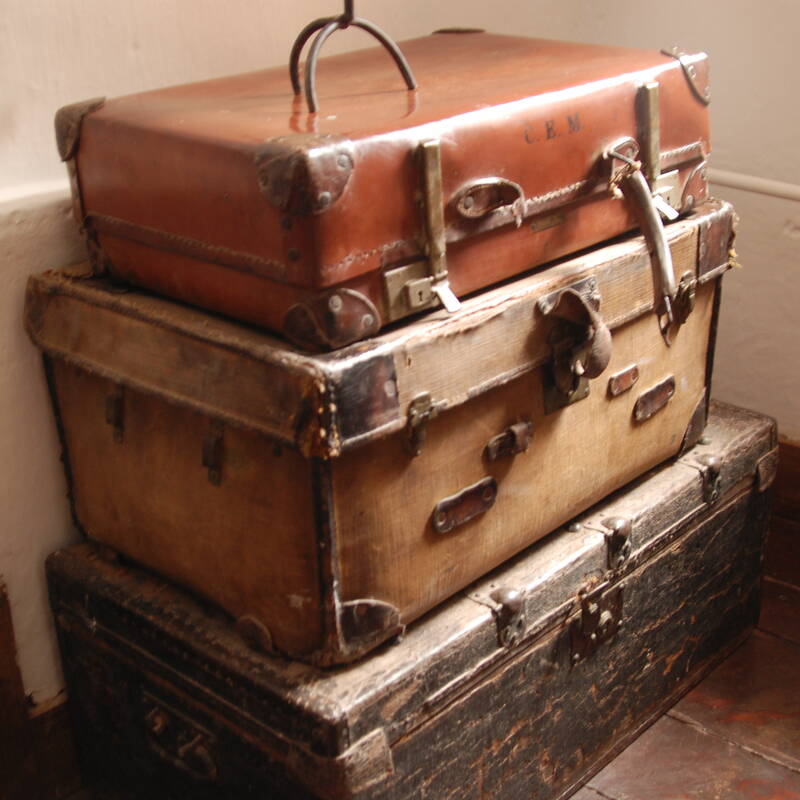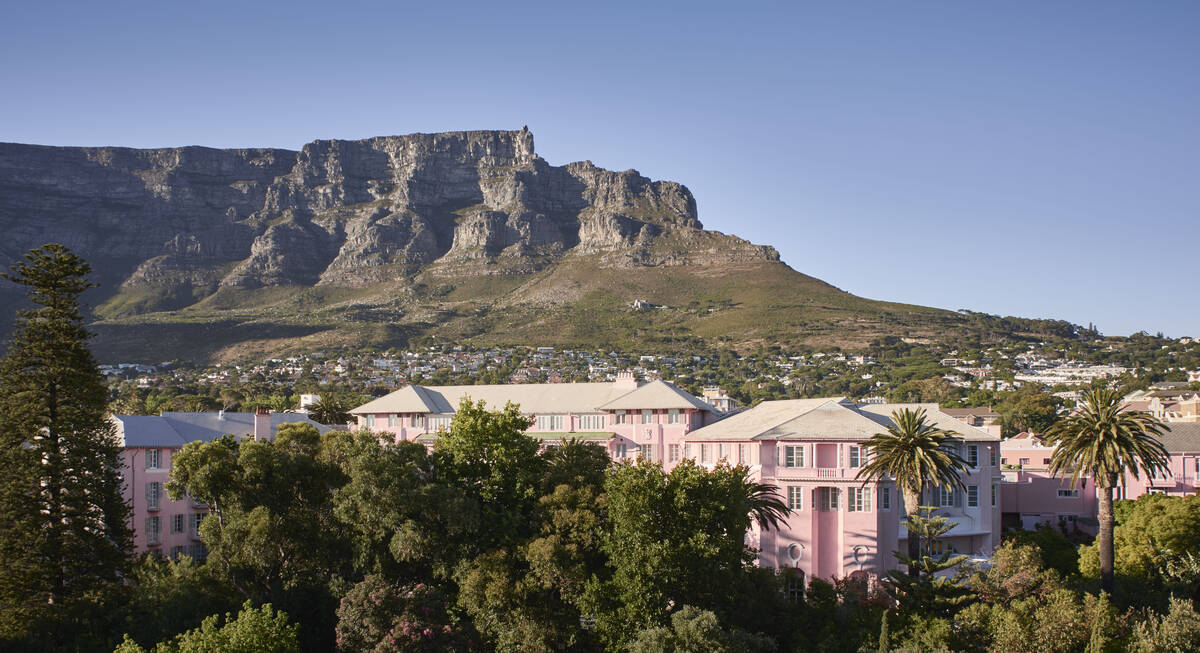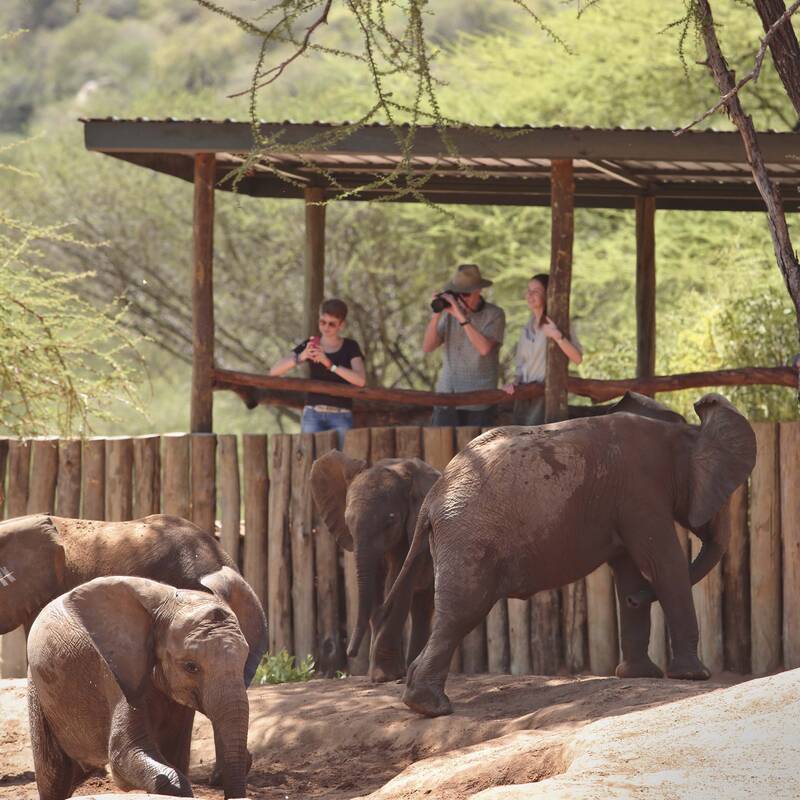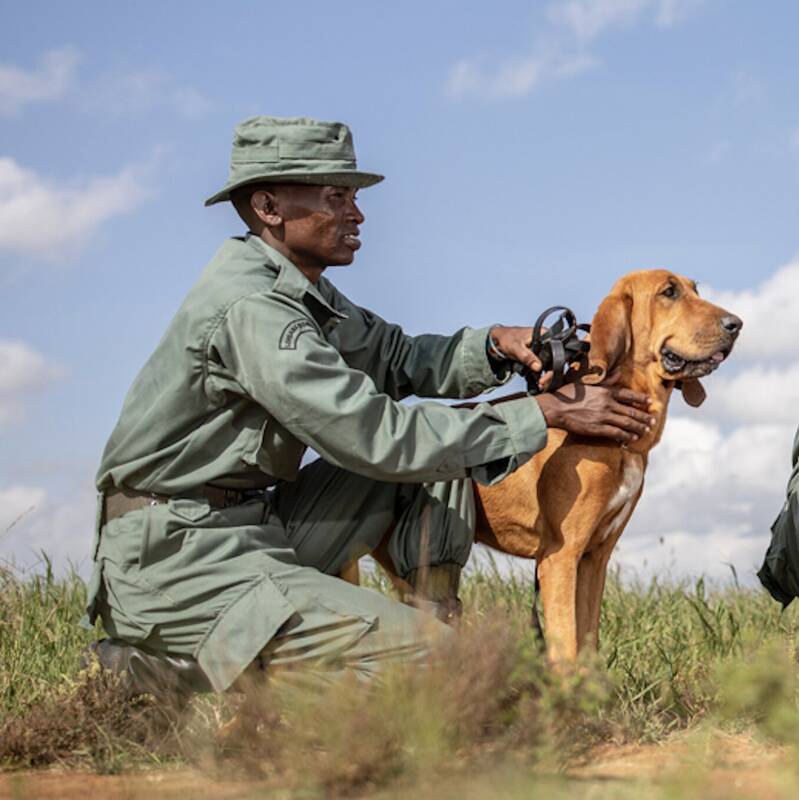Overview: Nairobi Elephant Orphanage visit
The Sheldrick Wildlife Trust elephant and rhino orphanage inside the western end of Nairobi National Park, offers a wonderful opportunity to meet staff caring for baby elephants, and sometimes baby rhinos, which have been orphaned by poachers, or have been lost or abandoned for natural reasons.
The trust was run for many years by Dame Daphne Sheldrick in memory of her husband David Sheldrick, the founding warden of Tsavo National Park. Dame Daphne died in 2018, but the hand-rearing methods and substitute elephant milk formula that she developed over many years of trial and error are now being replicated across Africa.
During the hour-long open house, the elephant keepers bring their juvenile charges out to play between 11:00 and 12:00. After some ad hoc football games and mud baths, the elephants and their keepers come up to an informal rope barrier stretched along one side of the ‘playground’ from where you can easily take photos. Each keeper gives a short presentation to the visitors nearest to him, explaining how orphaned elephants need to be cared for. The youngest infants are assigned keepers for individual 24-hour guardianship, a responsibility that includes sleeping in their stables. Without the love of a surrogate family and plenty of stimulation, orphaned baby elephants fail to thrive: they can succumb to fatal infections when teething, and, even if they survive, can grow up disturbed and unhappy and badly prepared for reintroduction to the wild.
Rearing orphaned rhinos and elephants
Rehabilitation is one of the Sheldrick Trust’s major preoccupations. For rhinos, which mature at twice the speed of elephants, this involves a year or more of walks with their keeper, introducing the orphan’s scent, via habitual dung middens and “urinal” bushes, to the wild population. Many of Nairobi National Park’s rhinos grew up in the Sheldrick nursery; the last surviving member of Amboseli’s famous long-horned rhino herd was rescued by the Trust in 1987 and is now a successful breeding female, having been released in Tsavo East National Park.In the case of elephants, which mature at about the same rate as humans, the process of reintroduction is closely attuned to the individual: outgoing elephants are encouraged, while they are young, to meet wild friends and potential adoptive mothers, again through walks with their keepers, most often in Tsavo National Park. More traumatised elephants take longer to find their feet. Matriarchs who were Sheldrick orphans themselves, such as Eleanor at Tsavo East, have been responsible for adopting many returnees.
Sheldrick Wildlife Trust visit details
The excursion to the SWT elephant and rhino orphanage turns out to be a mini-highlight for many visitors to Kenya - a shining example of conservation and animal welfare work combined with genuine behavioural research to help protect a species that is always under threat.You can visit SWT from any of our hotels in the Nairobi area on any day of the year except Christmas Day. Since the trust reopened to the public in 2021 after being closed to visitors for more than a year during the pandemic, pre-booking is required and can be done from 90 days to 2 days prior to your visit. Please note early booking is strongly recommended as the available slots frequently get booked up very quickly. If you’re staying at Giraffe Manor, The Emakoko or Nairobi Tented Camp, a visit can easily be incorporated into the activities that are included in your stay. The orphanage is inside Nairobi National Park, and while you enter through a private gate (the Banda Gate on Magadi Road), KWS national park fees are payable since 2023. If you’re staying at another hotel, we will book a driver-guide and private vehicle for you, and you can incorporate other Nairobi visits into the same half- or full-day private vehicle use. The driver will pick you up and drop you back when you choose.
The SWT 11:00-12:00 visit costs US$20 per person (age 12 and above) and US$5 per child (age 11 or under). The rates for Kenya residents and citizens are Ksh2000 and Ksh500 respectively. The session can be quite busy with other overseas visitors as well as Kenyans, including school parties. If you’d like a more private experience, you can also make an exclusive visit at a much higher cost in the afternoon for a private party of up to 12 people ($US1,200-US$1,500). This private visit enables you to have one-to-one encounters with the keepers and their elephants, usually as the orphans are being settled down for the night in the sables.
Age restrictions None, but children need to be under control at all times.
Availability: Any day except Christmas day. Please request to book a visit in advance when booking your safari with Expert Africa.
Please note: Expert Africa only books excursions as a part of a full, Expert Africa itinerary.
- Start location
- Any of Expert Africa's hotels in the Nairobi area
- End location
- Back at your hotel
- Meals included
- No meals are included
- Duration
- One hour, by pre-booking only
Photo gallery
What to look forward to.
The DSWT Elephant Orphanage is a highlight for many people visiting the city.
Proceedings usually start with a bit of elephant football…
…before the keepers bring their charges over to meet the day's guests.
Each keeper talks about his orphan…
…and explains the importance of the close relationship between the baby elephant and the surrogate mother.
Nairobi Elephant Orphanage visit reviews
49 independent first-hand comments from our travellers.
Ideas for holidays which can include Nairobi Elephant Orphanage visit
Add this experience to these trip ideas or contact us to start planning your own tailor-made safari to Kenya.

Looking for inspiration on where to travel next?
Visit our trip chooser to explore your options and find inspiration for your perfect African adventure
Inspire meOther excursions in Kenya
Inspiration and great ideas for other experiences in Kenya to include in your safari.
Kenya fact file
Below, you'll find useful information to help you prepare for your time in Kenya

Kenya safari packing list
Advice and tips on what to take on safari

LGBT travel in Kenya
Attitude, the law & our experiences

Safety in Kenya
Keeping safe, our experiences & our advice

Tipping in Kenya
Expectations & guidelines for tipping

Weather & climate
The best time to visit Kenya




















